“ A trained person is one who can do the chief things which it is important for him to do better than he could without training ”
John Dewey, Democracy and Education (1916). copy citation
| Author | John Dewey |
|---|---|
| Source | Democracy and Education |
| Topic | train |
| Date | 1916 |
| Language | English |
| Reference | |
| Note | |
| Weblink | http://www.gutenberg.org/files/852/852-h/852-h.htm |
Context
“A theory which has had great vogue and which came into existence before the notion of growth had much influence is known as the theory of "formal discipline." It has in view a correct ideal; one outcome of education should be the creation of specific powers of accomplishment. A trained person is one who can do the chief things which it is important for him to do better than he could without training: "better" signifying greater ease, efficiency, economy, promptness, etc. That this is an outcome of education was indicated in what was said about habits as the product of educative development. But the theory in question takes, as it were, a short cut;”
source


